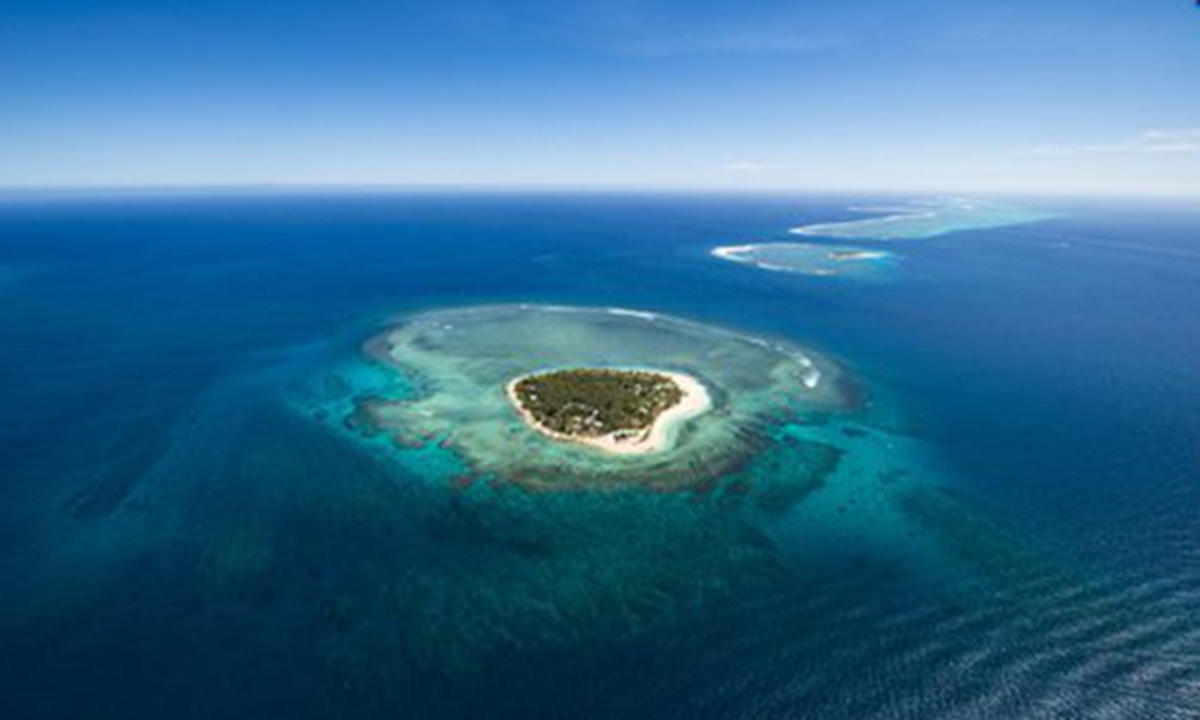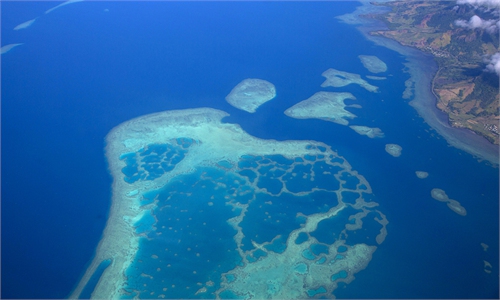Taiwan separatists stir up conflicts in Fiji to attract attention of US, Australia

A bird's eye view of Tavarua, a heart shaped island of Fiji Photo: Courtesy of Tourism Fiji
Chinese authorities denounced the allegations by the separatist Democratic Progressive Party (DPP) on the Taiwan island of Chinese Embassy diplomats in Fiji attacking DPP representatives on the ground.
The Taiwan island's attempt of stirring up conflicts in the South Pacific aims to attract the public attention, hoping the US and Australia will intervene in the matter amid tense cross-Taiwan Straits relations, an expert said.
The staff members of the Taipei trade office in Fiji have caused injuries to one diplomat from the Chinese Embassy in Fiji when they acted provocatively against the embassy diplomats who were carrying out official duties in the public, the embassy announced on Monday, correcting some media reports about Chinese diplomats assaulting staff members of the Taipei office.
The incident occurred at an event held by the Taipei trade office on October 8, where staff members from the office blatantly displayed fake "national flags" at the event, which were also seen on the cakes, according to an official statement of the Chinese Foreign Ministry. This so-called "national day" event violates the one-China principle and the relevant rules and regulations of the Fijian government, according to the ministry and the Chinese embassy in the South Pacific country.
Western media like Reuters and local media reports in Taiwan told a different story by claiming that a staff member from the Taipei trade office in Fiji was in hospital with a head injury after "being assaulted" by diplomats from the Chinese Embassy. Tseng Hou-jen, a DPP official, was quoted as saying in Taiwan media that Chinese mainland diplomats stormed into the event.
The DPP also accused Chinese embassy officials of forcing their way into the event to "take pictures and collect information," referring the "brutal and irrational action" as part of the mainland's so-called Wolf Warrior diplomacy, according to media reports.
Shortly after the Chinese Embassy in Fiji denounced those allegations, Zhao Lijian, spokesperson of the Chinese Foreign Ministry, refuted them with more details of the incident.
First, there are no so-called "diplomats" from the Taiwan island in Fiji, Zhao said. The Fiji government has been adhering to the one-China principle and asked commercial institutions from Taiwan island to change the names of their offices in 2019, forbidding any attempt to create "two Chinas" or "one China, one Taiwan" internationally, Zhao added.
"The allegations concerning Chinese embassy staff are totally inconsistent with the facts," the Chinese Embassy in Fiji said in an official statement released on Monday.
That evening, Taipei trade office members initiated verbal provocations and physical attacks toward the Chinese Embassy staff, who were carrying out official duties on the ground, causing physical injuries to one Chinese diplomat and damaging their property, Zhao said.
More countries in the South Pacific recognized the one-China principle by cutting "diplomatic ties" with the island of Taiwan in recent years, especially after the Solomon Islands and Kiribati broke ties with Taiwan within a week in September 2019.
The police in Fiji told local media that it only received one complaint from the embassy, revealing that a staff member from the Taipei trade office there had assaulted the embassy staff.
Ana Naisoro, spokesperson for the police, told local media Fijivillage that there was no report of the Taipei trade office employee being assaulted.
The Taiwan separatist authority is trying to make trouble to grab the attention of Australia and the US, hoping them to step in to the matter, Yu Lei, chief research fellow at the research center for Pacific island countries at Liaocheng University in East China's Shandong Province, told the Global Times on Monday.
"The Resolution 2758 of the UN General Assembly states that there's only one China in the world and Taiwan is an inalienable part of China. As a result, in terms of international law and the Vienna Convention, Taiwan does not have any diplomats in Fiji," Yu said.
Displaying banners or flags to imply it as "independent country" violates the UN resolution, and as a UN member, Fiji is undertaking the legitimate act of not recognizing those Taiwan staff as "diplomats," the expert added.


